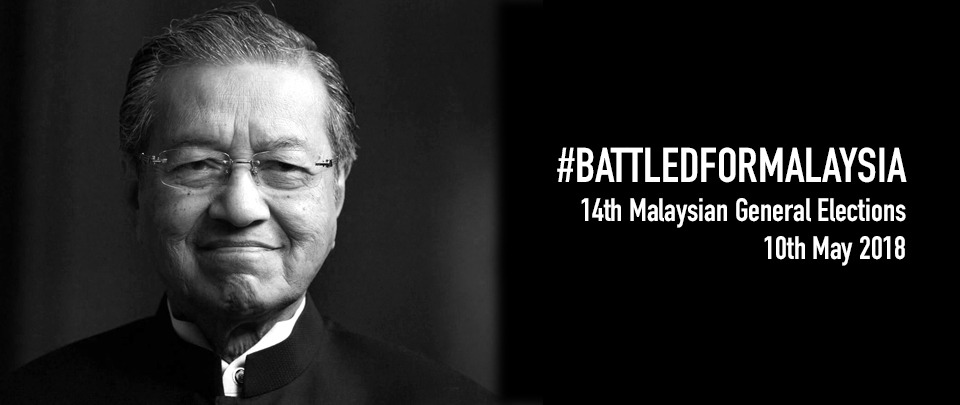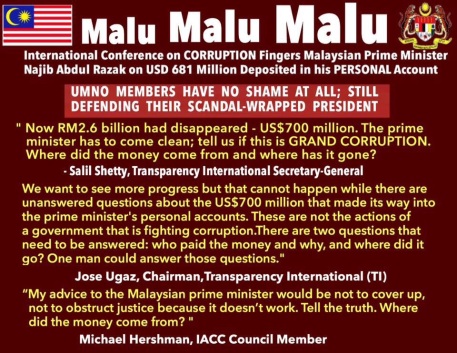Whether it was a tsunami or tidal storm, GE14 hit Barisan Nasional for six, a blow so severe that its members, leaders and component parties are still reeling from it.
The Pakatan Harapan pact did not achieve this all by itself, of course. It had the support of a majority of Malaysians and, no less, a Barisan that had repeatedly shot itself in both feet.
Even after a string of scandals, Barisan failed to explain any of them satisfactorily or at all. It also failed to provide convincing arguments to justify its pleas of innocence – critically, as a general election loomed.
Instead, what an electorate saw was a chain of evasive actions, avoidance of independent scrutiny and familiar denials – or a deafening silence. These occurred amid a growing lack of transparency and the absence of credible rebuttals that had become the new normal.
At various BN campaign rallies, the public turnout ranged from low to very low. At several other familiar constituencies, BN did not appear at all – had BN given up this time, local residents wondered.
Then there was the error of BN leaders believing in their own rhetoric of success, as if it were guaranteed in perpetuity. Such rhetoric may be useful to rally the troops on the campaign trail, but believing in it for a false confidence is fatal.
Worse, actions by the Elections Commission (EC) seen as selective and partial against Pakatan shifted more popular sympathy and support towards it. Questionable technicalities that disqualified Tian Chua from his candidacy, and barring PPBM from contesting, added to the sympathy and support.
Worst of all, targeting Tun Mahathir personally appeared to many voters as spiteful, disrespectful and in bad taste. For many, it revealed a lowering of campaign standards, ingratitude and the absence of a positive record to be proud of.
A negative campaign always has its costs. One aimed against Mahathir in particular is likely to backfire badly. In attacking him for his age and thus his supposed incapacity, his detractors ignored how their narrative was not shared by many. Age also means experience and distinction, particularly in Asian societies.
Mahathir is particularly associated with Malaysia’s best years in development, growth, progress and national pride at home and abroad. The country recovered relatively swiftly even when the worst economic crisis struck in the 1990s.
In singling him out, Mahathir’s foes only contrasted Malaysia’s current predicament with the nation’s glory days in his time. That was yet another bad strategic move.
Then a bizarre action based on a technicality backfired grotesquely – cutting out Mahathir’s face from campaign posters because his party was not officially registered. It focused public attention on the EC’s failure to register PPBM, whatever the reason, confirming the sense of bias and campaign vulgarity that seemed ingrained.
BN’s overall underestimation of Pakatan centred on its underestimation of Mahathir. For many he represented a tried and tested leadership that was both savvy and successful.
Besides, those aware of Mahathir’s political fortunes also know of his formidable and unbroken record of defeating every rival he encountered and every opponent who dared challenge him.
In the early 1980s, Prime Minister Tun Hussein Onn had chosen Tun Ghazali Shafie as his successor. Senior UMNO figures including Mahathir approached Hussein with an ultimatum to change that choice.
Mahathir succeeded Hussein instead. As Prime Minister, Mahathir defeated all challengers in turn: Tengku Razaleigh Hamzah, Tun Musa Hitam and Datuk Seri Anwar Ibrahim.
Fifteen years after retirement Mahathir returned to politics to take on Datuk Seri Najib Razak – and defeated him as well. Mahathir may be in his 90s and with a heart condition, but evidently he is no ordinary nonagenarian.
BN had also underestimated Pakatan’s strengths by overlooking its own weaknesses.
A series of scandals involving various public institutions came together because for many people these still had to be addressed or resolved properly: 1MDB, Tabung Haji, Armed Forces Fund Board (LTAT), the National Feedlot Corporation, Felda, Felda Global Ventures, Gatco and MARA.
Whatever the details, as public institutions they implicated the government of the day in the public mind. That is a critical liability of incumbency.
These institutions also happened to affect the livelihoods and future of a largely Malay community, with an impending election much of whose result hangs on the choice of that community.
Meanwhile, public dissent against the Establishment as represented by the Barisan continued to grow. On the Pakatan leadership front, another development spelt Barisan’s doom – the alliance between Mahathir and Anwar.
Since 1998 Anwar was in the political wilderness if not also in prison, and since 2003 Mahathir was in retirement. The institutional flaws at party and government levels gave way to deficiencies and excesses in their absence and their mutual estrangement.
For GE-14 both their forces came together, in the rebirth of an alliance between Malaysia’s two savviest politicians. Four opposition parties came together in agreeing on Mahathir as leader, thus posing the stiffest challenge to Barisan ever.
In addition, the Pakatan parties even agreed on using the same symbol at the polls – a significant step that made a difference with voters who might otherwise have been confused over the candidates.
As if all these challenging developments for Barisan were not enough, independent analysts who should have known better were giving Barisan better than even chances of winning.
They seemed to be deliberately underplaying Pakatan’s chances to avoid panicking Barisan, thus offsetting possible attempts to sabotage Pakatan’s prospects.
This, added to Barisan’s complacency in avoiding the harsh realities of the day, meant only one thing – a historic defeat. Number crunching aside, a Pakatan win could have been gleaned from the feeling on the ground.
As in the Philippines in 1986, Indonesia in 1998 and Thailand in 2006, the mood for change became palpable by March 2018.
In particular, those who underestimate Mahathir do so at their own peril. Not only has he not slowed down, he appears able to go further this time.
While Mahathir 1.0 could shape the discourse and narrative of issues, Mahathir 2.0 can also determine the context and trajectory those issues take.
After Pakatan swept West Malaysia, including Perak despite some initial difficulties, it is approaching belated wins in both Sabah and Sarawak, Barisan’s former stronghold states.
For many, only last week a Pakatan win seemed near-impossible even with a simple majority. But just a day after that victory, much of both West and East Malaysia seemed set to go Pakatan’s way.
Within hours of a new federal government, and during a celebratory public holiday, moves were already afoot in Kota Kinabalu and Kuching in Pakatan’s favour.
Pakatan-friendly Warisan in Sabah has claimed a majority in the State Assembly while Mahathir has been in private talks with Sarawak Governor Tun Abdul Taib Mahmud.
Very suddenly, the opposition pact nobody gave much hope for is fast becoming the new mainstream coalition. Not only has Pakatan defeated Barisan but is set to replace it altogether.
In the 1980s Mahathir remade UMNO with UMNO Baru. Today, one generation on, he is remaking Barisan Nasional as a whole with Pakatan Harapan – but with quite different qualities and objectives.
This is what age is known to produce: wisdom and experience.
WRITER – Bunn Nagara is a Senior Fellow at the Institute of Strategic and International Studies (ISIS) Malaysia.
Bunn Nagara
– https://dinmerican.wordpress.com






No comments:
Post a Comment
Note: Only a member of this blog may post a comment.